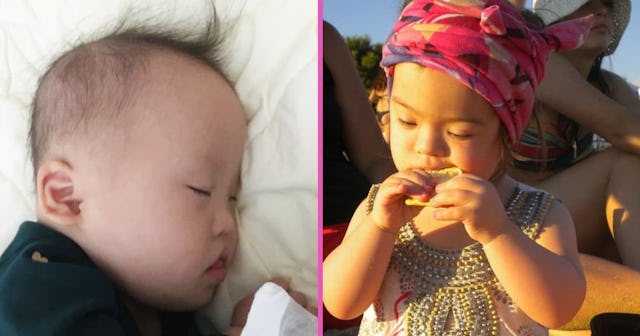After A Prenatal Diagnosis Of Down Syndrome, I Chose Love Over My Fears

Two roads diverged in a yellow wood
And sorry I could not travel both And be one traveler, long I stood And looked down one as far as I could
– Robert Frost
We found out about my baby’s Down syndrome diagnosis early on at 12 weeks. Early enough for no one else to know about the pregnancy. Early enough to follow medical advice to terminate, cope with the loss, and move on.
Either way there was grief: grief that my second child was not what we were “expecting,” grief that she might be born with limitations, physical and mental, that my first child did not have. Grief that my carefully laid out plans of lifestyle design (raising children flexibly, anywhere in the world) may have just been shattered.
There was termination pressure from nurses and doctors, concern and fear from family, sorrow and support from friends. Responses ranged from tactfully incompetent to awkward. I was told I shouldn’t have the baby because of her extra chromosome and then painted dire scenarios of what it could do to my life.
Courtesy of Li Tian
Did I want to…
– Face my child living under my roof for the rest of my life, entirely dependent?
– Live with the stress potentially destroying my marriage, and becoming a single mom to a special needs baby? – Create a burden on me, my family, and (quoting the doctor) society, to bring someone into the world who might not someday be able to function independently, let alone “contribute?”
If I knew it could be a possibility why wouldn’t I do something about it?
I can’t blame any of the voices. Yet they still made me angry. They were incredibly presumptuous.
So I gave all these stories some space, shed tears of self pity, and used them as motivation. The tears felt indulgent, but now from a better place I can say, it’s okay to grieve.
The biggest punch in the gut was being told it wasn’t fair to my oldest child. That probably gave me the most emotional reaction. Logically I know as a parent it’s not my job to create a “perfect” world for my children, free of friction. Nor do I really even know what a perfect world looks like.
Courtesy of Li Tian
How would it really affect my oldest child? It’s impossible to know. Once we’ve gone down one path, it’s incomparable to another. What I do know is that I will love my children. Might I miss out on parts of my oldest daughter’s growth and lose some connection with her? Maybe. But having spent most of the last few years flexing my schedule to meet her needs, maybe this is a reality I just have to let go of.
Finding out about the diagnosis three months into the pregnancy, while shocking, did give us a good amount of time to think, process, and find a little peace. My ideal parenting philosophy is to meet my children where they are, nurturing and encouraging them, and accepting where they end up. It’s not an easy balance for overzealous parents who see the pitfalls up ahead.
What does coming from an Asian immigrant family have anything to do with acceptance? Asians are known for their high expectations of their children. Asian parents infamously don’t accept A- on report cards, pile kids into extracurriculars hoping for overachievement, and sneer at low performance.
It’s pretty cut and dry what the traditional Asian parent would expect of a child, and what the course of action would be with a sub optimal prenatal diagnosis. My grandparents dealt with wars and fleeing communist or colonial persecution. They had a brutally limited number of options, and their world view reflects that.
Courtesy of Li Tian
There’s almost a ruthless practicality to it – can’t you just drop this fetus and try again?
Asians are not alone; Iceland has very high abortion rates for DS fetuses. I’m 100% solidly pro choice because every family is different. Statistics don’t really matter when there are only two such completely opposite outcomes.
I’m fortunate to have a partner who also is an amazing father – someone I know can tackle life challenges. Our flexible lifestyle makes me less concerned about meeting obstacles alone.
At times, I’d almost wished for a birth diagnosis. If I didn’t have the choice of termination, maybe I wouldn’t experience all the angst. We might have our reservations about having this baby, but I believe in my heart that as a parent, I should support my children and let them decide their place in the world.
Vincent Van Gogh said, “What is done in love is done well.”
In the end, I chose love, instead of fear. It’s my guiding light when I’m feeling anxious, illuminating the path forward.
Two roads diverged in a wood, and I—
I took the one less traveled by, And that has made all the difference.
– Robert Frost
This article was originally published on